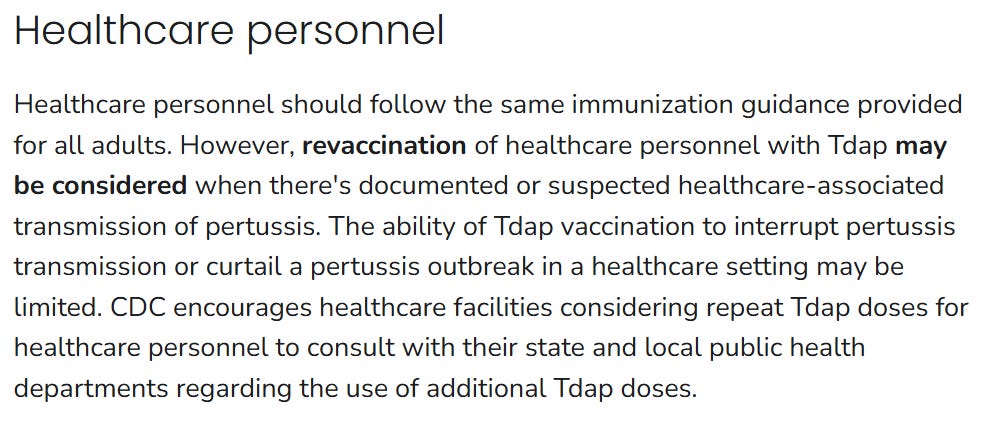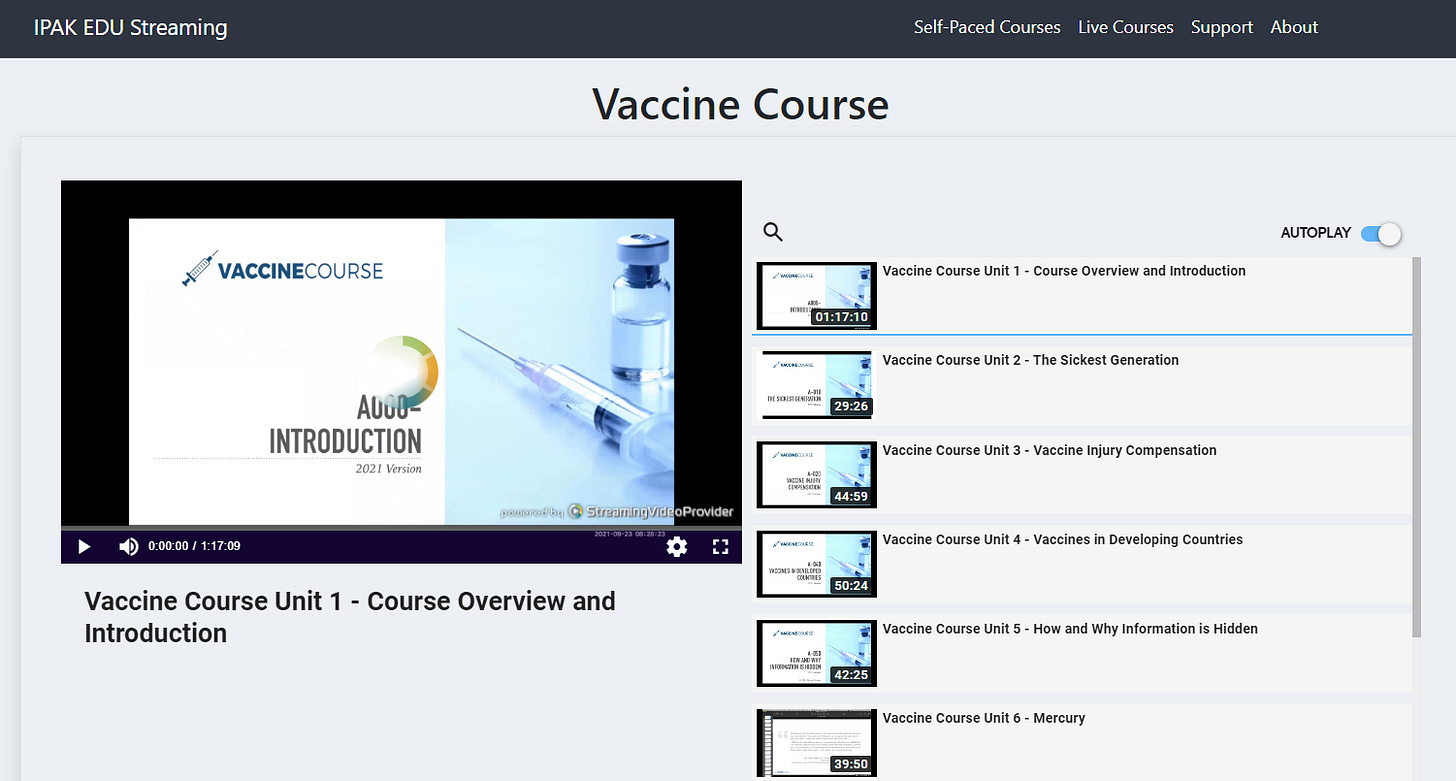CBS News Misinforms the Public on Pertussis Vaccination Policy: Dr. Lyons-Weiler Issues a Call for Retraction
CBS's Dr. Jon Lapook overlooked key scientific data about waning immunity and asymptomatic carriers. Finding the asymptomatic infection rate among healthcare workers should be a national priority.
CBS News recently aired a segment declaring that the CDC issued an “alarming report” on pertussis infection rates.
The CDC report, cited by CBS, actually says that whooping cough cases are lower than in previous years. The CDC’s report guesses that the reduced number of cases may be due to increased vaccination coverage; however, global and national data indicate a concerning drop in vaccination coverage for many routine vaccines, including pertussis, due to heightened vaccine skepticism following the COVID-19 pandemic.
The CBS report also suggested adults should receive a pertussis (whooping cough) booster every 10 years, emphasizing that this would help protect infants from the disease. The segment featured commentary from Dr. Jon LaPook, who implied that regular Tdap boosters in adults would prevent the transmission of pertussis to young infants, the most vulnerable population. However, this information is misleading. Here we clarify this misinformation, drawing on data from the FDA, the CDC, and leading pertussis experts like Dr. James Cherry and biomedical research scientist Dr. James Lyons-Weiler.
CBS’s Claims vs. Reality
The CBS segment implied that the Tdap booster every 10 years is necessary to stop the spread of pertussis, particularly in adults who come into contact with infants. This claim misrepresents the CDC’s guidance, which only recommends Tdap for tetanus and diphtheria every 10 years, not pertussis. In fact, immunity from the acellular pertussis vaccine wanes significantly within just a few years.
The CDC acknowledges that the pertussis component of the Tdap vaccine is effective for only about 2-4 years (CDC). After this period, vaccine recipients are just as susceptible to symptomatic disease as non-vaccinated.
Starting sometime between 9/25/24 and 9/29/24, CDC decided to specify that they do not recommend a 10-year booster dose. Per CDC:
“No recommendation for booster doses against pertussis
Immunity to pertussis following Tdap vaccination wanes after a few years. However, there's no recommendation to administer booster doses to maintain protection against pertussis.”
On September 25, 2024, CDC’s pertussis page looked like this:
At the time, it did not specify that there is no CDC recommendation for adult boosters. It does, however, say CDC recommends a tetanus booster (Td or Tdap) every 10 years for all adults.
In other words, they recommended Td or Tdap on the pertussis page.
It seems Dr. LaPook took this as a recommendation for pertussis vaccination every 10 years?
And it seems that CDC added the section “No recommendation for booster doses against pertussis” by September 29, 2024.
More importantly, because the vaccine fails to prevent infection but instead targets symptoms, vaccinated recipients are actually at greater risk of becoming asymptomatic carriers if exposed. They therefore could able to transmit the disease without showing symptoms. This certainly calls into question Dr. LaPook's advice to "rely on" vaccinated adults for immunity.
The pertussis (whooping cough) vaccine does not confer herd immunity. While effective at reducing symptoms in individuals, the acellular pertussis vaccine does not prevent asymptomatic infection or transmission. This makes relying on herd immunity as a protective measure for pertussis is difficult. Thus, attributing reduced pertussis rates to increased vaccination coverage would be problematic if herd immunity were implied, especially since vaccination coverage itself has been declining due to increased skepticism.
Waning Immunity: What the Data Show
Studies repeatedly show the waning efficacy of the Tdap vaccine in preventing pertussis. For example, a study published in Pediatrics found that the effectiveness of the Tdap vaccine declines from 73% in the first year to just 34% within 2-4 years (Pediatrics, KQED). This decrease is likely contributing to recent pertussis outbreaks among adolescents and adults, even those who are vaccinated (KQED). Dr. James Cherry, a leading expert on pertussis, has long criticized the shortcomings of the acellular pertussis vaccine, which replaced the whole-cell vaccine in 1997. While safer, the acellular vaccine offers shorter-lasting immunity, creating a situation where regular boosters may not adequately protect against transmission (UCLA, eScholarship).
Asymptomatic Spread: A Universal Threat?
One of the most significant issues omitted in CBS’s reporting is the risk of asymptomatic spread. The FDA has clearly stated that vaccinated individuals may still become infected and unknowingly spread pertussis (FDA). This presents a critical risk to infants who are not fully vaccinated until around 6 months of age. The CBS report’s failure to mention this risk gives a false sense of security to viewers, suggesting that regular boosters eliminate the threat of active infection and transmission.
The only time the public becomes aware of a transmission chain is when young infants fall ill with pertussis. At this point, it’s nearly impossible to trace the source of infection because asymptomatic carriers are likely to be unaware they are spreading the disease. Without symptoms, vaccinated adults - including healthcare professionals - may feel reassured by the CBS recommendation yet remain potential vectors for transmission (See Dr. Cherry’s papers, below).
Medical Professionals and Unproven Booster Strategies
While it is common practice for medical professionals to receive Tdap boosters every 10 years as part of general tetanus and diphtheria immunization, the effectiveness of these boosters in preventing asymptomatic pertussis infections is untested. Dr. Art Reingold, who chairs the CDC’s Advisory Committee on Immunization Practices for pertussis, has pointed out that additional Tdap doses are unlikely to reduce pertussis transmission (KQED) significantly.
Therefore, CBS’s assertion that these boosters are a solution for preventing the spread of whooping cough is misleading and could lead to harmful public health assumptions. If medical professionals who regularly receive ten-year boosters can still become asymptomatic carriers, this raises serious concerns about the effectiveness and wisdom of this strategy for the general adult population.
Recommendation: A Call for Retraction
Given the misleading information presented in the CBS report, it is recommended that CBS retract its story. The network must correct its portrayal of pertussis vaccination policies, acknowledging that regular boosters do not effectively prevent asymptomatic spread. Moreover, it is crucial to educate the public on the limitations of the current vaccine and the reality that pertussis is treatable with antibiotics when caught early - and the vaccine confounds early detection due to its reduction in symptoms.
Understanding the nature of pertussis transmission is now a health priority in the United States. The vaccine does not provide long-term protection, and asymptomatic carriers pose a significant risk to infants. Public health messaging must focus on the dangers of relying solely on booster shots (UCLA eScholarship).
Conclusion
Inaccurate reporting on pertussis vaccination has serious public health implications. CBS’s report perpetuates the myth that a 10-year Tdap booster provides sufficient protection against pertussis when, in fact, the immunity wanes within a few years. The risk of asymptomatic spread is greater than CBS acknowledges, and the network must issue a retraction to prevent further misinformation. By relying on experts like Dr. James Cherry and Dr. James Lyons-Weiler and highlighting the treatability of pertussis with early intervention, we can craft a more effective public health strategy for protecting infants from this preventable disease.
References:
CBS News: CDC reports alarming increase in whooping cough and walking pneumonia among children https://www.cbsnews.com/video/cdc-reports-alarming-increase-in-whooping-cough-and-walking-pneumonia-among-children/
Dr. James Lyons-Weiler, jameslyonsweiler.com Desperation Over Pertussis Vaccine Failure is Driving Pharma to Use Scary Propaganda
Dr. James Cherry
The 112-Year Odyssey of Pertussis and Pertussis Vaccines-Mistakes Made and Implications for the Future. J Pediatric Infect Dis Soc. 2019 Sep 25;8(4):334-341. doi: 10.1093/jpids/piz005. PMID: 30793754.
Epidemic Pertussis and Acellular Pertussis Vaccine Failure in the 21st Century
KQED, Report on Waning Pertussis Vaccine Effectiveness: KQED
Take the IPAK-EDU VACCINE COURSE - SELF-PACED OPTION







It's always going to be a challenge to build robust, sustained immunity through use of a needle.
Getting some sun and addressing nutritional deficiencies is far more effective.
***
Increased serum antimicrobial peptide LL-37 and HBD-2 combined with 25-hydroxyvitamin D3 deficiency in infants with pertussis (2020)
... Results: The serum 25(OH)D3 levels in the children with mild (27.30 ± 5.98 ng/ml) and severe (24.40 ± 6.27 ng/ml) pertussis were significantly lower than that in the healthy group (30.16 ± 5.13 ng/ml; p <0.01). The vitamin D deficiency rates in children with mild (55.9%) and severe (78.12%) pertussis were significantly higher than that in the control group (34%; p < 0.01).
https://www.jidc.org/index.php/journal/article/view/33175712
We had a giant pertussis wave in Spain Oct'23 - July'24. The coverage is almost 100%, unaffected by the covid debacle. It is obvious that that vaccine does not reduce infection or tansmission.